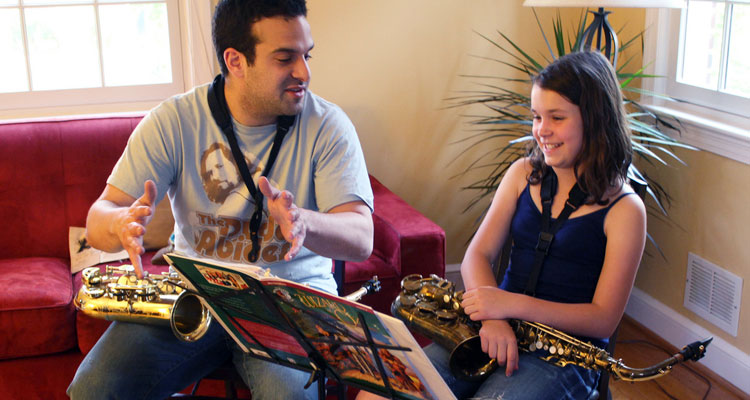You’ve selected the perfect instrument for your aspiring music student. You’ve arranged for weekly lessons. You’ve even gone the extra mile by setting up a mini music studio in your home.
The groundwork is set for your aspiring pianist/saxophonist/drummer to take the music world by storm.
Only one problem: How do you get your music student to practice?
Creating the time, sparking the desire, and maintaining the interest can be just as important as getting the instruments and providing the space for success.
Trained in classical violin since she was four, K12 video producer Jackie Ho, now 26, didn’t have that problem. Her mom was a music teacher highly involved in Jackie’s musical upbringing. Jackie would not only excel at her craft but become a violin teacher herself.
“I would tell my students that it’s not ‘practice makes perfect.’ It’s ‘practice makes permanent,’ so the way you practice affects whether you’re going to improve,” she says. “You can practice the same thing the wrong way and never get better. It’s not necessarily the amount (of practice time), it’s the approach.”
Jackie practiced a lot—sometimes as much as five or six hours a day on the weekend.
“But I definitely wanted to practice (at least) one hour a day,” she said. “To me, the more important thing was consistency. You can’t just practice once a week. You have to make it a regular part of your schedule.
“I’ve always been self-disciplined, and I had a competitive side. There were always recitals or an end-result that I was working toward. I always wanted to be first chair in my orchestra, or I wanted to ‘wow’ the audience during a recital, or I wanted that solo part for the concert. Those things motivated me to practice.”
Both music and educational professionals note that practice and self-discipline are positive qualities that go hand-in-hand.
“Regular practicing is a path towards self-discipline that goes way beyond music,” writes Anastasia Tsioulcas in “Getting Kids To Practice Music—Without Tears or Tantrums,” a blog post for National Public Radio’s “From the Top” series. “It’s a skill that has hugely positive ramifications for personal fulfillment and lifetime success.
“But the trick is that self-motivated discipline isn’t exactly first nature for most kids. So, it’s up to families to help create positive, engaging, and fun ways to practice as a path towards self-motivation.”
Some of the tips Tsioulcas discusses in her interviews with budding musicians and parents include: setting goals, taking occasional breaks, incorporating games, and changing the practice schedule.
Music teachers suggest that young students keep a practice log and work on small pieces of music at a time. Large pieces can intimidate. For some students, practicing early in the day (school schedule permitting), when alertness levels are high, can be advantageous. Another trick is to keep the instrument out of its case and ready for use at all times.
How much practice is enough? Perhaps 30 to 40 minutes for those in grammar school; probably at least an hour a day for older music students who are serious about improving their work.
“To transform practicing into a rewarding activity, parents should encourage reaching daily musical goals,” writes Dr. Robert A. Cutietta, Dean of the University of Southern California Thornton School of Music, in his blog “How to Motivate Your Child to Practice” for PBS.org. “For example, instead of saying that 30 minutes of practice is enough regardless of what is achieved, you might say, ‘Today the goal of practicing is to play the first eight measures of your piece without any mistakes.’”
“Whether reaching this goal takes 12 minutes or 40 minutes isn’t important. What is important is that the child knows the musical goal of each daily practice session and feels motivated to be as efficient as possible while practicing in order to reach that goal and feel that sense of accomplishment. If the goal is playing the first eight measures on Monday, the logical goal for Tuesday is to play the next eight. Pretty soon, the child will acknowledge the cumulative goal of the week: to play the entire piece free of mistakes.”
Cutietta suggest that parents not negotiate when it comes to practice time.
“While it may be tempting, don’t bargain with practice time,” he writes. “Although in trying to skip a day, your child may really mean, ‘I will practice double tomorrow,’ this sets the standard that practice time is negotiable.”
Even the most dedicated students and their parents might find practice to be a drag from time to time. Jenny Silva, CEO of Sheet Music Plus, provides excellent advice for times when that occur in her blog “10 Tips to Motivate Your Child to Practice.” Her tips include having a consistent practice time, setting realistic expectations, and praising the efforts not the end results.
Learning Liftoff provides an excellent source of information about music—with topics ranging from music education to games—for students of all ages.
[schedule on=’2015-06-22′ at=”03:01″ expon=’2015-07-31′ expat=”23:55″]As a further incentive for your child to practice, why not encourage him or her to enter K12’s Music Showcase for the chance to win an iTunes gift card and maybe even Best in Show! Be sure to enter by July 31, 2015![/schedule]
Featured Image – woodleywonderworks / CC by 2.0





































